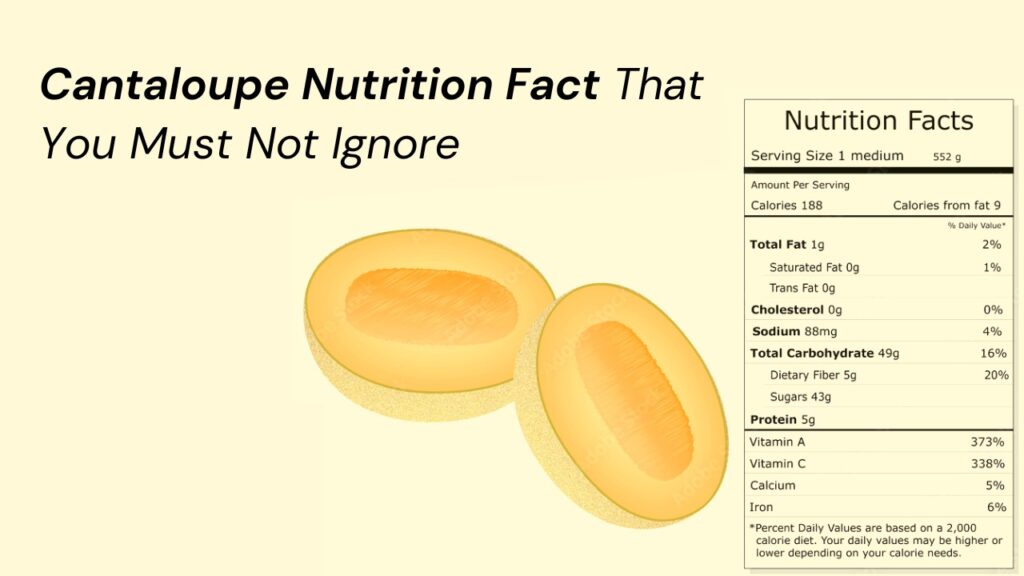In the United States, people call muskmelon “cantaloupe.” It is a tasty summer treat and a key ingredient in many refreshing fruit salads. These fruits have a tough, “netted” peel on the outside. “Real” cantaloupes don’t have the same neat nets. Instead, they have “sutures” that have grooves that are deeper.
Cantaloupes are related to other melons, squashes, and cucumbers because they all come from the Cucurbitaceae family, which means they all have the same ancestor. Even though no one knows for sure where the melon came from, most people think it came from Africa, but this theory has been argued about in the past. Cantaloupe grows in gardens all over the world in the modern era. Cantaloupe nutrition facts are undeniable, and doctors all over the world believe that they are good for health.
Cantaloupe is a popular fruit for a good reason. It is not too sweet and has a wide range of tastes. Today, we are going to learn about the many benefits that cantaloupes have.
Cantaloupes Have Plenty of Good Effects on Human Health
Cantaloupe has antioxidants that help reduce inflammation. Getting rid of free radicals, which cause oxidative stress and cell damage, makes you less likely to get diabetes, heart disease, arthritis, and other diseases. There are other good things about cantaloupe.
They Make the Skin Well of Whoever Eats Them
Cantaloupe has a lot of vitamin A. Just one cup has more than 100% of the daily value. Also, it has almost all of the vitamin C you need for the day. Both of these nutrients are important for good skin health. Vitamin A can help repair sun damage, and vitamin C can help the body make more collagen.
Cantaloupe nutrition facts fiber may contain the antioxidants lutein and zeaxanthin, which give many fruits and vegetables their yellow and red colors. This may be one reason why cantaloupe may be good for eye health. When combined with vitamin A, these antioxidants are very important for keeping your eyes healthy and your eyesight good. They could also help with a condition called age-related macular degeneration.
They are Good for the One Suffering From Asthma
Beta carotene, which is found in cantaloupes nutrition facts 100g, is a type of vitamin A that may help prevent asthma from starting later in life. Choline, which is found in cantaloupes, is an antioxidant that may also help asthmatics by reducing inflammation.
Are Very Beneficial to Keep Heart Problems Away
Cantaloupe has a lot of fiber, potassium, and vitamin C, which all help keep your heart healthy. Potassium can help bring down high blood pressure, which is a known risk factor for heart disease. By eating more fiber, you can cut down on the “bad” cholesterol in your body. It also helps to lower blood pressure, which is a nice bonus.

Cancer Risk Goes Down With Cantaloupes
Cantaloupe is a healthy addition to your diet because it helps reduce inflammation and fights free radicals. It may even lower your risk of getting cancer. The fruit has a lot of fiber, which has been linked to a lower risk of colon cancer.
Let’s know about the nutrition content of Cantaloupes
Cantaloupes have antioxidants like beta carotene, lutein, zeaxanthin, and cryptoxanthin. The fruit also has almost all of the daily value of vitamin C, which is important for keeping your immune system healthy.
Cantaloupe is an easy way to keep up your potassium levels. But if you eat too much, your kidneys could get hurt. The minerals in your body are cleaned out by your kidneys. Hyperkalemia happens when the body tries to process too much potassium at once. A higher potassium level in the blood is linked to a higher risk of cardiac arrest.
What Negative Consequences Can Cantaloupes Have On Your Health?
If you eat too much cantaloupe, it may also cause problems with your digestive system, like diarrhea, cramps, and bloating. If you have cancer, are going to have surgery on your gut, or have an inflammatory illness, you should watch how much fiber you eat.
Some people say that you shouldn’t eat cantaloupe after dark. There are several arguments in favor of this view. Cantaloupe makes you so thirsty that if you eat it too close to bedtime, you might have to go to the bathroom in the middle of the night. Some people worry that the sugar will cause their blood sugar to rising, which will keep them awake and make it an unhealthy choice right before bed.
Both of these could be true for the very small portion of the population that cares deeply about these issues. It’s true that not everyone can eat cantaloupe late at night, but for most of us, it’s not a problem.
Final thoughts!
Even after you pick a cantaloupe, it will keep getting riper for a few more days.
If it’s still hard and doesn’t smell very good, it might not taste as good as you thought it would. Don’t buy a melon that has nicks or other damage. A common sign is that it is a host for bacteria. If you buy a melon before it is fully ripe, let it sit out for a few days at room temperature.

